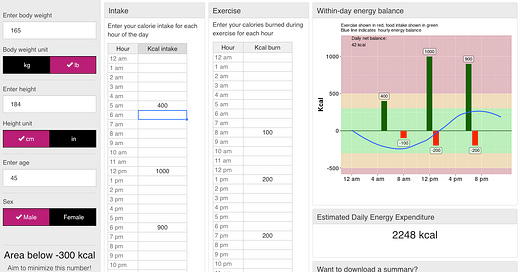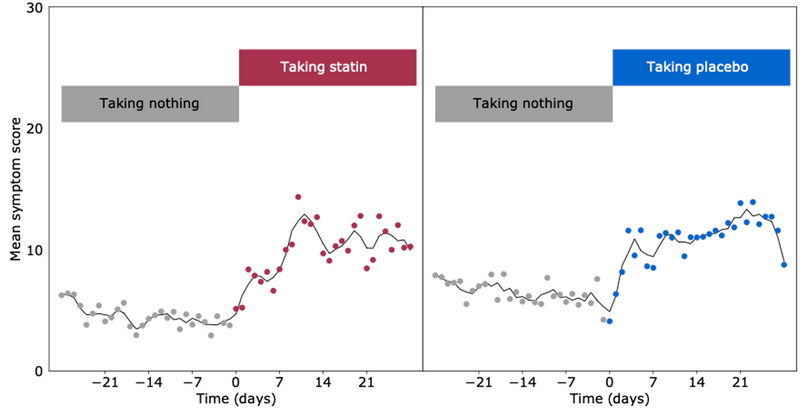Personal Science Week - 22 Sep 2022
Energy balance calculator, track scientific papers with Zotero, n-of-1 trials for statins
You’re too busy to read yet another newsletter, so we try to keep these emails short and practical. But if you have extra time, our previous issues are always available on our homepage: personalscience.substack.com.
What’s your energy balance?
Most people are taught to think that healthy eating is about what or how you eat: this much fat, that much protein. But when you eat might be just as important, especially if you want to ensure your energy remains at optimal levels.
I’ve been finding Jeff Rothschild’s Within-Day Energy Balance Calculation App a surprisingly interesting way to think about when I should eat and exercise. Enter some basic biometric data plus rough estimates of food intake and exercise timing throughout the day and it tells your within-day energy balance. Try to arrange your eating and exercise to stay within the green shaded area of the plot.

Play with the different parameters and you’ll soon see some limitations — there’s no way to account for sleep, for example — but this model has made me more aware of the role of timing in food and exercise. No model is perfect, but this one has me thinking, which is the whole point of Personal Science.
Track scientific papers with Zotero
Each year thousands of PhDs are awarded to students grateful for one open source tool that made their theses possible. Zotero is a free app for desktop and iOS that helps organize scientific papers, making it an indispensable resource for Personal Scientists as well. Store references to scientific papers, books, magazine articles — any publication useful to your research — and Zotero keeps it all in one place. Keep notes on any of the papers you read and easily search through everything later. Access it on your device or online through their web app; generate a bibliography in any of the most common formats.
Zotero also lets you join groups that make it easy to share a collection of papers with others who have the same interest. For example, check out the Public QS Bibliography, with more than 500 references to studies related to Quantified Self and Personal Science. Or search for a group of interest to you, like the microbiome or lyme disease.
N-of-1 trials for statins
Here’s the interesting (and scary!) takeaway from the Harvard Data Science Review special issue on personalized n-of-1 trials. In a year-long study, 50 people were carefully alternated between a statin drug and a placebo while carefully recording any negative symptoms. On average, it didn’t seem to matter which pill the doctor gave them—people felt side effects either way.
The article suggests that clinicians begin to adopt these n-of-1 style studies for patients who complain of side effects from necessary drugs. At least in this case, showing the patient proof from their own data seems to reassure them enough to stop feeling negatively toward the medicine. (We discussed similar ideas of John Sarno in our Sep 8 issue).
About Personal Science
Personal Science is the process of using the scientific method to solve problems and get better results on an individual, personal level. Following the motto of the Royal Society, established in 1660, nullius in verba, we take nobody’s word for it.
This newsletter is a weekly summary of a few observations we think will be interesting to anyone who wants to be a personal scientist. Press the button below to share a (free) subscription with others.




